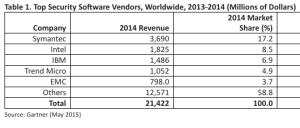Booming Security Market Reflects Shift to Cloud

Seemingly nonstop reports of network security breaches—the latest one at the Internal Revenue Service—and heightened awareness about the need to button down corporate infrastructure appears to be reflected in a survey of the global security software market released this week.
Meanwhile, Symantec continues to dominate the security software market as other enterprise vendors like Intel and IBM grab market share.
Market researcher Gartner Inc. pegged the worldwide security software market at $21.4 billion in 2014, up 5.3 percent over the previous year. Declining sales in areas like endpoint protection platforms were offset by emerging sectors like "enterprise content-aware data loss prevention," or DLP.
Other high-growth areas, according to the Gartner survey released Wednesday (May 27), include identity governance and administration along with security information and event management.
Another software security sector being propelled by cloud and hybrid deployments are secure web gateways, or SWG. "Even though the SWG segment experienced single-digit growth in 2014, cloud-based and hybrid SWG deployments are becoming increasingly popular," explained Gartner analyst Sid Deshpande.
"As organizations' corporate data traffic becomes more exposed to the Internet and moves out of the control of traditional network security boundaries, SWG technologies continue to be an important piece of the overall security technology strategy of most organizations," Deshpande added.
Indeed, network security threats continue to grow. The web site SearchSecurity.com reported this week on the discovery of a router vulnerability in a widely used Linux kernel driver that could lead to denial-of-service attacks or remote code execution. The report said the router flaw could affect products from as many as 26 network equipment vendors.
Meanwhile, the growth of the software security market also reflects the increasing preference for hybrid cloud infrastructure. As more cloud vendors roll out their hybrid strategies, security is becoming a primary component. Moreover, security features like network patch upgrades are increasingly being automated.
For example, EMC, which announced the acquisition of Virtustream this week, stressed that the enterprise cloud software and services provider would help it provide "rigorous security and automated compliance," including encryption of data in motion and at rest. Security experts have been warning that archival data requires security on a par with current data.
While Symantec remains the leading provider of security software, vendors like EMC who have expanded beyond storage technologies to hybrid cloud offerings are making inroads. EMC finished fifth in Gartner's annual rankings of the top security software vendors. Intel, which acquired security specialist McAfee in 2010, ranked second followed by IBM.
Gartner said the data loss prevention market grew at a 15.8 percent clip last year, accounting for nearly half of the overall growth of the security software sector. However, the market watcher is forecasting much slower growth for the DLP sector this year as options like "DLP lite" and what amounts to security-as-a-service emerge.
Related
George Leopold has written about science and technology for more than 30 years, focusing on electronics and aerospace technology. He previously served as executive editor of Electronic Engineering Times. Leopold is the author of "Calculated Risk: The Supersonic Life and Times of Gus Grissom" (Purdue University Press, 2016).











